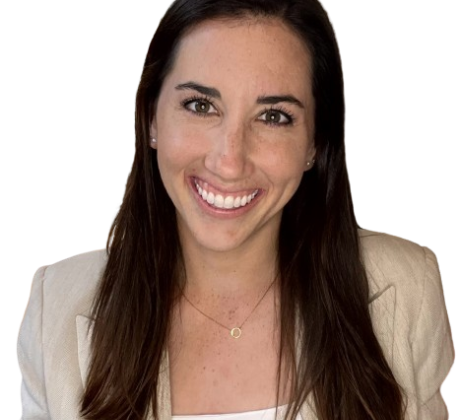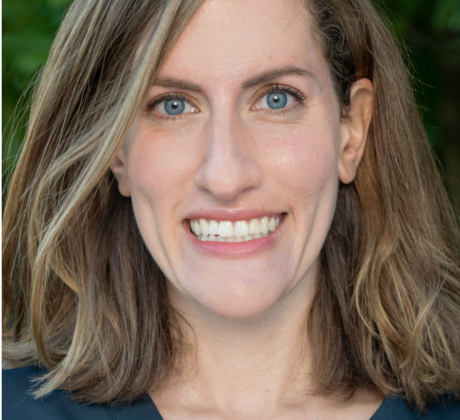Stephanie Ostroff is a speech-language pathologist and journalist. She enjoys blending knowledge from both fields to shine a light on innovators and changemakers in health care.


Hannah Berns, MHCI ’22, steps beyond the bedside with a degree in health care innovation
Eleven years into a career as an emergency services nurse across four different hospitals, Hannah Berns wanted more.
While she found her work with patients deeply meaningful, she felt excluded from the health care conversation.
“Nobody talks directly to nurses.” she says. “Researchers talk to physicians. The businesses talk to the admins of the hospitals. But nurses are just not generally given a seat at the table.”
Today Berns is claiming a seat for herself and other nurses by leveraging the Master of Health Care Innovation (MHCI) she earned at the University of Pennsylvania.
After completing the online program in 2022, she transitioned from direct patient care to the role of Chief Operating Officer at The Nursing Beat. There, she’s reinvented her career and helped build a media organization that not only speaks directly to nurses, but speaks up for them. Her content reaches a community of 100,000 nurses, and she attends business and tech conferences, advocating for the profession.
“I will always be a nurse,” says Berns. “But if I’ve learned anything, it’s that you can have just as much impact away from the bedside as you can at the bedside.”
Taking Action
For Berns, the COVID-19 pandemic was a turning point. The physical and emotional toll of patient care left her struggling with burnout. Isolated from friends and family as the virus spread, she began searching for a different path.
“I had always known I wanted to get a master’s, but I didn’t know what degree until I found the MHCI,” she says. “I knew I didn’t want to get a master’s in nursing, because I didn’t want to stay in the hospital.”
As nurses, we can triage and delegate and make things happen. I have this beautiful skill set from nursing, and then what the MHCI did is teach me how to use that skill set as a nurse entrepreneur.
The MHCI’s emphasis on interdisciplinary collaboration, world-renowned faculty, and solutions-driven curriculum helped her reimagine her nursing career. Ultimately, the skills she honed in the MHCI classroom paved the way to a non-clinical role after graduation.
In Berns’s final semester, she developed a project for her Pitching Innovation lab, taught by Bob Tedeschi, MA. She identified an unmet need in health care and a potential solution: A media organization that centered on nurses’ perspectives.
“There was no real news outlet tailoring its language to nurses,” she says. “And that’s essentially the problem we’re solving. In under five minutes a day, this is what you need to know to better yourself and patient care.”
Berns was recruited as COO at a health care media company one month after graduation and tasked with overhauling the organization. Stepping into the new role, she rebranded the company as The Nursing Beat and shifted its focus and content to nurses. Berns’s Pitching Innovation project has become reality. The Nursing Beat platform aims to empower nurses by delivering short-form, high-impact news stories through a nursing lens. Under her leadership, the audience has increased tenfold in two years.
That growth is a byproduct of collaboration. Berns has found she can apply some of the same skills she honed on the hospital floor in novel ways when paired with her innovation toolkit.
“As nurses, we can triage and delegate and make things happen,” she says. “I have this beautiful skill set from nursing, and then what the MHCI did is teach me how to use that skill set as a nurse entrepreneur—and also how to identify problems that I don’t have the skill set to solve. It taught me that you don’t have to be all encompassing. You get a good team together, and it will work out.”
Claiming Space for Nurses
As a “nursepreneur,” Berns aims to shatter stereotypes about where nurses belong and what they can do beyond the bedside.
She attends events like South by Southwest (SXSW) and ViVe, a digital health tech conference, stepping into spaces where nurses have historically been sidelined. In 2024, ViVe launched its Nursing @ ViVe initiative, drawing nearly 200 nurses to a conference traditionally dominated by investors and health care executives. Berns is encouraged by the inclusion of more nurses, but she knows there is still work to be done.
If I’ve learned anything, it’s that you can have just as much impact away from the bedside as you can at the bedside.
“We’ll meet people,” she says about her conference experience, “and they’ll say, ‘Oh, you guys are nurses? Really?’ And we’re like, ‘Yes, we are still nurses. We are always going to be nurses.’ I will never let my nursing license lapse. But we’re starting to chisel away the traditional definition of what a nurse does. There are many nurses out there that don’t do direct patient care, who are having as much of an impact on health care. And I think amplifying that message is incredible.”
At conferences, Berns speaks to stakeholders across the health care landscape, making sure the nursing perspective informs emerging technology. Building connections feels comfortable, thanks to her graduate education at Penn.
“There is a finesse to networking that’s not always talked about,” she says. “But the MHCI hosted meetings and events, and gave us space for networking. It taught me how to network.”
Becoming an Advocate
Berns’ role introduces her to artificial intelligence solutions that could improve health care. Her goal is to bring the realities of the hospital floor and the conference booth into better alignment, bridging the gap between health tech innovations and their end users—often nurses.
After attending events, she sheds light on opportunities at the bedside and beyond in articles for The Nursing Beat. Her coverage is a reminder to other nurses that they belong in these spaces, too.
“We’re a gold mine of information that’s not often utilized,” she says. “Don’t underestimate the power of a nurse.”
But Berns knows making a career in nursing sustainable requires support beyond the latest technological innovations. The MHCI has given her a deeper understanding of the health care ecosystem and how to effect change. This awareness—combined with a robust innovation skillset—empowers her to speak up on behalf of nurses in her non-clinical role.
“We don’t have enough resources to prolong the professional life of a nurse,” says Berns. “And that is what is so critical right now and needs to be a wake-up call to health care administration and local, state, and federal governments: You need to protect the health care workforce physically, financially, and psychologically.”
As her own nursing career evolves, Berns plans to continue advocating for the profession while bolstering other nurses with knowledge and community.
“I want to make sure every nurse knows that they have a voice,” she says. “And that voice is listened to by decision makers.”

